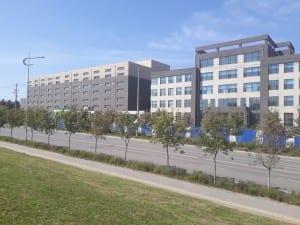
The COFCO bioplastics plant with the PLA (polylactide) technology from thyssenkrupp’s polymer specialists Uhde Inventa-Fischer Source: thyssenkrupp
thyssenkrupp Industrial Solutions (Essen, Germany; www.thyssenkrupp-industrial-solutions.com) announced that the world’s first commercial plant based on the company’s patented manufacturing process for the bioplastic polylactide (PLA) — the PLAneo technology — recently started production in Changchun, China. It is operated by the Jilin COFCO Biomaterial Corporation, a subsidiary of COFCO, China’s largest food and beverage group. The new plant produces all standard PLA types, among other things for the production of eco-friendly packaging, fibers, textiles and engineering plastics.
Sami Pelkonen, CEO of the Electrolysis & Polymers Technologies business unit of thyssenkrupp Industrial Solutions: “The bioplastics market will continue to grow in the coming years, not least due to the increasing environmental awareness of industry, governments and consumers. With our PLAneo® technology we want to do our bit to make the plastics sector more sustainable and resource-friendly. With it we enable our customers to produce high-quality bioplastics with a wide range of properties – at a price that is competitive with conventional plastics.”
Polyactide (PLA) is a 100% bio-based and compostable plastic, which thanks to its physical and mechanical properties, can replace conventional oil-based polymers in many areas. The starting material for PLA production is lactic acid, which is recovered from renewable resources such as sugar, starch or cellulose.
PLAneo technology converts lactic acid into PLA in a particularly efficient and resource-friendly way. Another advantage is its transferability to large-scale plants with capacities of up to 100,000 tons per year.